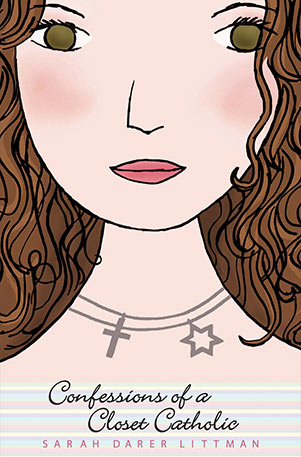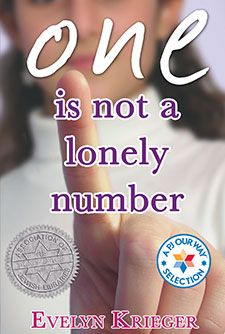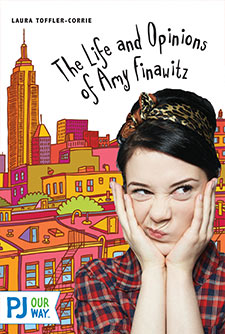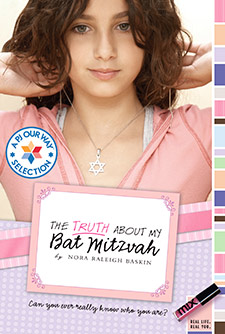Confessions of a Closet Catholic
Justine’s managed to poison the family poodle, steal her brother’s decoder ring, and hang up on her sister’s admirer. But that’s not all. Wait till her mom finds what she’s hidden in her closet.
Average Rating
( hint: Login to leave a review! )
204 Reviews
Leave Review
What the Book is About
Jewish Content & Values
Positive Role Models
Content Advisory
Talk it Over!
More for You
Eleven-year-old Justine Silver is experiencing a serious identity crisis. Originally from New Rochelle, NY, Justine’s world felt very Jewish; her best friend, Shira Weinstein, was observant, and her family lived near the synagogue, even if they didn’t attend very often. Now that they’ve moved to Greenwich, Connecticut, Justine’s become more curious about the religions of the world and since her new best friend, Mac McAllister, has given up chocolate for Lent, Justine’s decided to get into the spirit and give up being Jewish for Lent, as well. But when her beloved Bubbe becomes seriously ill (after Justine visits a church), she feels somehow responsible and even guilty for not honoring her grandmother’s Holocaust experience by exploring other faiths. Justine’s voice is irreverent and hilarious as she finds guidance in a number of unlikely places in this Sydney Taylor award winning book.
- Justine’s family are Conservative Jews who attend synagogue for High Holidays and celebrate Shabbat with a family meal.
- Justine’s Bubbe is a Hungarian Holocaust survivor who observes Jewish law; all of her other grandparents are Jewish and also speak Yiddish (words are defined in a glossary at the end of the book).
- Justine’s family observes traditional Jewish law after a death in the family by sitting shiva, tearing Kriyah, and saying Kaddish.
- Justine has many philosophical conversations about Judaism and religious observance with various family members and friends.
- Bubbe is a loving and supporting grandmother to Justine. She understands her crisis of faith and encourages her to ask questions.
- Father Joseph is kind to Justine and helps her to deal with her bereavement with practical advice.
- Mrs. McAllister is a great mom of a large brood, she cares deeply for her children and their friends, bakes cookies, and encourages Justine to look inside herself for solutions.
- Rabbi Freeman welcomes Justine into his synagogue and introduces her to the concept that God is more nuanced than the heavenly Terminator that she envisions.
- Justine and her family must deal with sickness and the inevitability of death as a beloved elderly relative passes on. Some children might feel sad to read of the death of a family member. Justine’s reflections as she tries on several faiths, including Islam, Buddhism, and Catholicism are quite humorous, age appropriate, and legitimate, but not always sensitive, tolerant, or respectful. Her comments are occasionally in poor taste but not actually disparaging towards other faiths and methods of observance. For example, the idea of dressing up a teddy bear as a priest and confessing to him in a closet might offend someone who finds comfort and inspiration in the confessional. Jussy’s spiritual journey continues past the end of the story, although we are left with a genuine impression that Orthodox Judaism may provide her with some of the answers that she is looking for.
- Some negative body image messages are scattered throughout this story; it’s noted, several times, how stylishly thin Helena (Justine’s sister) and her mother are, in contrast to Justine’s short, chubby figure. Emotional eating and dieting are also referred to. These not-so-subtle observations wrongly imply that not all girls’ teen bodies are strong and beautiful, regardless of size and shape.
Picture Justine, five years later, at age 16. What do you think her life will be like?
The Mourner’s Kaddish, or Orphan’s Kaddish, is a short prayer of praise of God, traditionally recited daily for eleven months after a parent’s death, and annually on the yartzeit, the anniversary of the loved one’s passing.
What the Book is About
Eleven-year-old Justine Silver is experiencing a serious identity crisis. Originally from New Rochelle, NY, Justine’s world felt very Jewish; her best friend, Shira Weinstein, was observant, and her family lived near the synagogue, even if they didn’t attend very often. Now that they’ve moved to Greenwich, Connecticut, Justine’s become more curious about the religions of the world and since her new best friend, Mac McAllister, has given up chocolate for Lent, Justine’s decided to get into the spirit and give up being Jewish for Lent, as well. But when her beloved Bubbe becomes seriously ill (after Justine visits a church), she feels somehow responsible and even guilty for not honoring her grandmother’s Holocaust experience by exploring other faiths. Justine’s voice is irreverent and hilarious as she finds guidance in a number of unlikely places in this Sydney Taylor award winning book.
Jewish Content & Values
- Justine’s family are Conservative Jews who attend synagogue for High Holidays and celebrate Shabbat with a family meal.
- Justine’s Bubbe is a Hungarian Holocaust survivor who observes Jewish law; all of her other grandparents are Jewish and also speak Yiddish (words are defined in a glossary at the end of the book).
- Justine’s family observes traditional Jewish law after a death in the family by sitting shiva, tearing Kriyah, and saying Kaddish.
- Justine has many philosophical conversations about Judaism and religious observance with various family members and friends.
Positive Role Models
- Bubbe is a loving and supporting grandmother to Justine. She understands her crisis of faith and encourages her to ask questions.
- Father Joseph is kind to Justine and helps her to deal with her bereavement with practical advice.
- Mrs. McAllister is a great mom of a large brood, she cares deeply for her children and their friends, bakes cookies, and encourages Justine to look inside herself for solutions.
- Rabbi Freeman welcomes Justine into his synagogue and introduces her to the concept that God is more nuanced than the heavenly Terminator that she envisions.
Content Advisory
- Justine and her family must deal with sickness and the inevitability of death as a beloved elderly relative passes on. Some children might feel sad to read of the death of a family member. Justine’s reflections as she tries on several faiths, including Islam, Buddhism, and Catholicism are quite humorous, age appropriate, and legitimate, but not always sensitive, tolerant, or respectful. Her comments are occasionally in poor taste but not actually disparaging towards other faiths and methods of observance. For example, the idea of dressing up a teddy bear as a priest and confessing to him in a closet might offend someone who finds comfort and inspiration in the confessional. Jussy’s spiritual journey continues past the end of the story, although we are left with a genuine impression that Orthodox Judaism may provide her with some of the answers that she is looking for.
- Some negative body image messages are scattered throughout this story; it’s noted, several times, how stylishly thin Helena (Justine’s sister) and her mother are, in contrast to Justine’s short, chubby figure. Emotional eating and dieting are also referred to. These not-so-subtle observations wrongly imply that not all girls’ teen bodies are strong and beautiful, regardless of size and shape.
Talk it Over!
Picture Justine, five years later, at age 16. What do you think her life will be like?
More for You
The Mourner’s Kaddish, or Orphan’s Kaddish, is a short prayer of praise of God, traditionally recited daily for eleven months after a parent’s death, and annually on the yartzeit, the anniversary of the loved one’s passing.




